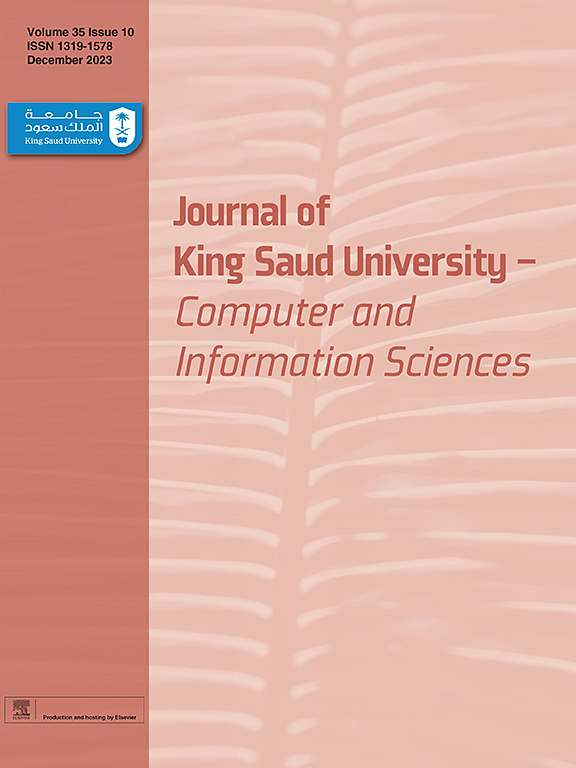基于阿拉伯语方面的情感分析的稳健性:基于转换器模型的全面探索
IF 6.1
2区 计算机科学
Q1 COMPUTER SCIENCE, INFORMATION SYSTEMS
Journal of King Saud University-Computer and Information Sciences
Pub Date : 2024-12-01
DOI:10.1016/j.jksuci.2024.102264
引用次数: 0
摘要
在技术飞速发展的时代,用户每天都会在社交媒体网络和电子商务平台上产生大量数据。这些数据蕴含着丰富的观点、情感、价值观和习惯,对消费者和企业都具有巨大的价值。手动利用这些非结构化数据既容易出错,又耗费时间。情感分析领域可自动分析这些数据中的人类观点。情感分析将文本分为正面、负面或中性情感。然而,它将文本分类局限于单一的情感极性,只提供了一个广泛的概述,而没有考虑到具体的方面。随着数据分析需求的不断增长,这种标准的情感极性分类已不再足够。基于方面的情感分析法应运而生,它能深入挖掘文本,揭示观点和视角。它可以识别文本中具有相应情感极性的多个方面。因此,人们对这一领域的兴趣与日俱增,近来许多研究人员都致力于解决英语语言中的这一问题。遗憾的是,阿拉伯语在这一领域的研究却很少。本研究将针对上述不足,使用两个专用语料库(AraMA 和 AraMAMS)研究四种转换器模型(即 AraBERT v2.0、ArBERT、MARBERT 和多语言 BERT)在提高阿拉伯语文本基于方面的情感分析准确性方面的潜力。大量实验表明,所提出的方法达到了预期效果,超过了该领域以往的研究结果。通过使用 AraBERT v2.0,AraMA 语料库中的方面类别检测和方面情感分类任务获得了最佳结果,F1-Measure 结果分别为 95.75% 和 92.83%。此外,在 AraMAMS 语料库中,使用 AraBERT v2.0 进行的方面类别检测和方面情感分类任务取得了最佳结果,F1-Measure 结果分别为 95.54% 和 89.52%。本文章由计算机程序翻译,如有差异,请以英文原文为准。
On the robustness of arabic aspect-based sentiment analysis: A comprehensive exploration of transformer-based models
In the era of rapid technological advancement, users generate an overwhelming volume of data on social media networks and e-commerce platforms daily. This data, rich in opinions, sentiments, values, and habits, holds immense value for both consumers and businesses. Leveraging this unstructured data manually is error-prone and time-consuming. The field of Sentiment Analysis automates the process of analyzing human opinions from this data. Sentiment Analysis classifies text into positive, negative, or neutral sentiments. However, it confines text classification to a single sentiment polarity, providing a broad overview without accounting for specific aspects. With the growing demand for data analysis, this standard sentiment polarity classification is no longer sufficient. Aspect-Based Sentiment Analysis has emerged to dig deeper into the text, uncovering perspectives and points of view. It can identify multiple aspects in text with corresponding sentiment polarity. Therefore, interest in this field has increased and many research efforts have been devoted recently to tackle this problem for the English language. Unfortunately, there is a scarcity of Arabic research in this field. This study will address the aforementioned deficiency by investigating the potential of four transformer models namely, AraBERT v2.0, ArBERT, MARBERT, and Multilingual BERT in enhancing the accuracy of Aspect-Based Sentiment Analysis for Arabic texts using two dedicated corpora (AraMA and AraMAMS). The extensive experiments revealed that the proposed approach achieved its expected effect surpassing the results of previous studies in the field. The best results of Aspect Category Detection and Aspect Sentiment Classification tasks in AraMA corpus were obtained by using AraBERT v2.0 with F1-Measure result equals to 95.75% and 92.83% respectively. In addition, the best result of Aspect Category Detection and Aspect Sentiment Classification tasks in AraMAMS corpus were achieved by using AraBERT v2.0 with F1-Measure result equals to 95.54% and 89.52% respectively.
求助全文
通过发布文献求助,成功后即可免费获取论文全文。
去求助
来源期刊

Journal of King Saud University-Computer and Information Sciences
COMPUTER SCIENCE, INFORMATION SYSTEMS-
CiteScore
10.50
自引率
8.70%
发文量
656
审稿时长
29 days
期刊介绍:
In 2022 the Journal of King Saud University - Computer and Information Sciences will become an author paid open access journal. Authors who submit their manuscript after October 31st 2021 will be asked to pay an Article Processing Charge (APC) after acceptance of their paper to make their work immediately, permanently, and freely accessible to all. The Journal of King Saud University Computer and Information Sciences is a refereed, international journal that covers all aspects of both foundations of computer and its practical applications.
 求助内容:
求助内容: 应助结果提醒方式:
应助结果提醒方式:


